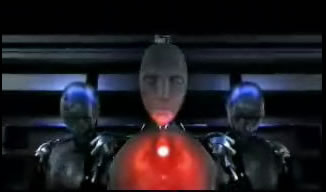Science Fiction
Dictionary
A B C D E F G H I J K L M N O P Q R S T U V W X Y Z
RoboEarth Cloud Engine Makes Local Bots Smarter

One of the key problems for roboticists trying to create robots small enough to work side-by-side with us humans in the home is to balance portability with computational power. An intriguing possibility is the RoboEarth Cloud Engine, which would allow your home robot to make use of computational resources based elsewhere.
(RoboEarth Cloud Engine video)
This video shows examples of how the RoboEarth Cloud Engine may help tomorrow's robots to increase their performance by leveraging the computational, storage, and communications infrastructure of modern data centers. The current Alpha release of the software framework allows developers to create their own robot cloud services. A number of robot cloud services, such as those illustrated in the video, are already under development.
All this discussion of robots communicating with distant server brains reminds me of the talk between robots (TBR) feature discussed by Frederik Pohl in his 1954 short story The Midas Plague. In the story, Henry is a companion robot; these robots cooperate with each other, sharing information to better server their masters:
"Fine! Well, get started on the other things, then.""Yes, sir," said Henry, and assumed the curious absent look of a robot talking on the TBR circuits - the Talk Between Robots radio - as it arranged the appointments for its master.
More recently, In the 2004 movie I, Robot, the advanced NS5 robots had a special feature: additional software and instructions could be downloaded wirelessly to individual robots. NS5's receiving a download show a red glow in the chest cavity.

(Middle NS5 Robot Gets A Download)
Via Kurzweil AI.
Scroll down for more stories in the same category. (Story submitted 3/16/2013)
Follow this kind of news @Technovelgy.| Email | RSS | Blog It | Stumble | del.icio.us | Digg | Reddit |
Would
you like to contribute a story tip?
It's easy:
Get the URL of the story, and the related sf author, and add
it here.
Comment/Join discussion ( 2 )
Related News Stories - (" Robotics ")
Atlas Robot Makes Uncomfortable Movements
'Not like me. A T-1000, advanced prototype. A mimetic poly-alloy. Liquid metal.' - James Cameron, 1991.
Humanoid Robots Tickle The Ivories
'The massive feet working the pedals, arms and hands flashing and glinting...' - Herbert Goldstone, 1953.
Golf Ball Test Robot Wears Them Out
"The robot solemnly hit a ball against the wall, picked it up and teed it, hit it again, over and again...' - Frederik Poh, 1954.
PaXini Supersensitive Robot Fingers
'My fingers are not that sensitive...' - Ray Cummings, 1931.
Technovelgy (that's tech-novel-gee!) is devoted to the creative science inventions and ideas of sf authors. Look for the Invention Category that interests you, the Glossary, the Invention Timeline, or see what's New.
Science Fiction
Timeline
1600-1899
1900-1939
1940's 1950's
1960's 1970's
1980's 1990's
2000's 2010's
Current News
The New Habitable Zones Include Asimov's Ribbon Worlds
'...there's a narrow belt where the climate is moderate.'
Can One Robot Do Many Tasks?
'... with the Master-operator all you have to do is push one! A remarkable achievement!'
Atlas Robot Makes Uncomfortable Movements
'Not like me. A T-1000, advanced prototype. A mimetic poly-alloy. Liquid metal.'
Boring Company Drills Asimov's Single Vehicle Tunnels
'It was riddled with holes that were the mouths of tunnels.'
Humanoid Robots Tickle The Ivories
'The massive feet working the pedals, arms and hands flashing and glinting...'
A Remarkable Coincidence
'There is a philosophical problem of some difficulty here...'
Cortex 1 - Today A Warehouse, Tomorrow A Calculator Planet
'There were cubic miles of it, and it glistened like a silvery Christmas tree...'
Perching Ambush Drones
'On the chest of drawers something was perched.'
Leader-Follower Autonomous Vehicle Technology
'Jason had been guiding the caravan of cars as usual...'
Golf Ball Test Robot Wears Them Out
"The robot solemnly hit a ball against the wall, picked it up and teed it, hit it again, over and again...'
Boring Company Vegas Loop Like Asimov Said
'There was a wall ahead... It was riddled with holes that were the mouths of tunnels.'
Rigid Metallic Clothing From Science Fiction To You
'...support the interior human structure against Jupiterís pull.'
Is The Seattle Ultrasonics C-200 A Heinlein Vibroblade?
'It ain't a vibroblade. It's steel. Messy.'
Roborock Saros Z70 Is A Robot Vacuum With An Arm
'Anything larger than a BB shot it picked up and placed in a tray...'
A Beautiful Visualization Of Compact Food
'The German chemists have discovered how to supply the needed elements in compact, undiluted form...'
Bone-Building Drug Evenity Approved
'Compounds devised by the biochemists for the rapid building of bone...'
